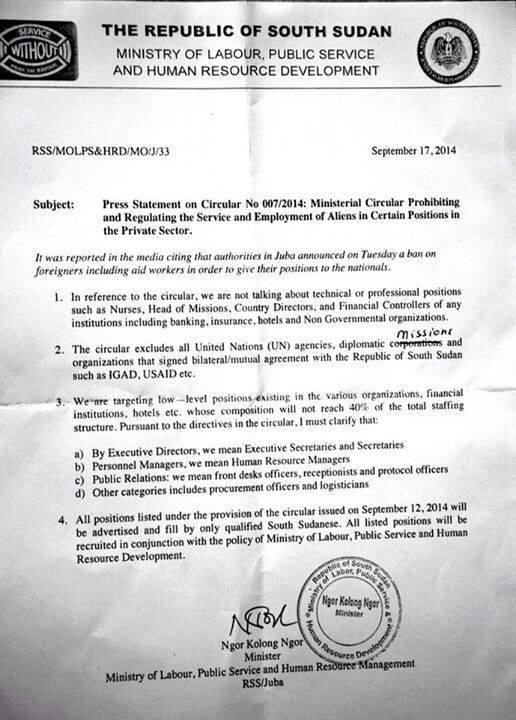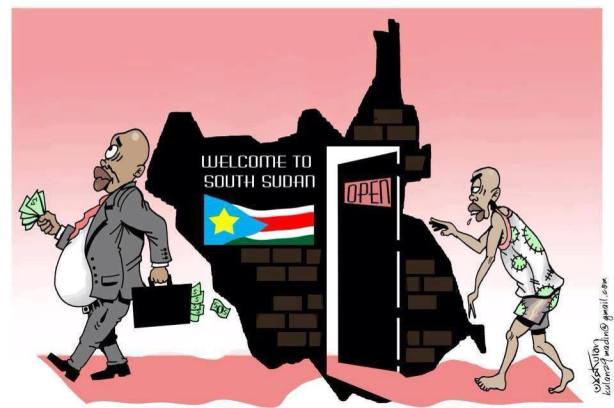By Agok Takpiny, Melbourne, Australia
The minister of labour Mr Ngor Kolong Ngor in the government of South Sudan issued a circular last week demanding that NGOs and other private businesses in the country must expel those expatriates who are doing jobs that can easily be done by the host country nationals (HCNs) by 15 October 2014 and filled those vacant positions with South Sudanese nationals.
This sparked an overly malicious outcry from our neighbours particularly Kenyans and Ugandans with some media outlets in those countries going as far as calling South Sudan a “kid who don’t know how to appreciate” and or a “person who bit a hand that feed him”. In addition, some individuals in social media from the aforementioned countries call South Sudanese primitives and monkeys.
However by looking at the current Kenyan president, his vice president and two former presidents and not to mention the influential opposition leader Mr Raila Odingga, I see myself (black South Sudanese) not so different from Kenyan in term of colour. Thus the monkey-like insult is simply misplaced and phony. Calling us people who don’t appreciate is also hypocritical, because if I sit down and try to reflect on what Kenyan people have done to South Sudanese during our 21 years civil war, I will not come up with a single good experience.
Kenyans have never been hospitable to South Sudanese despite the fact that the exponential growth of their economy in the last decade or so can be directly or indirectly attributed to South Sudanese. In 1990s UNHCR opened up a refugee camp in the middle of the most inhospitable part of Kenya (Kakuma) for South Sudanese refugees. Kakuma became the largest refugee camp in the world which created thousands of jobs for Kenyans.
The same UN turned Lokichoggio (a remote town in northern Kenya) into a coordination centre for South Sudan relief. Again thousands of Kenyans were employed, many small businesses including brothels were booming and Lokichoggio became a thriving major economics centre in Turkana district overtaking Lodwar. Furthermore other better-off South Sudanese flocked to “down country” including Nairobi, Eldoret, Kitale etc. and rented thousands of houses, they also took their kids to schools and pay schools fees.
Nevertheless, without appreciating the fortune which South Sudanese brought to Kenya, South Sudanese were openly subjected to some despicable harassments and police brutality. For South Sudanese, walking down on a street in Nairobi became a warrant for a kidnap-like arrest and to be release one must pay ransom/bribe to the police, it became a way of life for South Sudanese living in Kenya.
It was only after the signing of the CPA in 2005 when Kenyans began to treat us like brothers and sisters. The change of behaviour came about because Kenyan saw the opportunity to exploit South Sudanese, it works. The exodus to South Sudan has begun, vendors, “professionals” with fakes certificates, thieves, prostitutes, you name it, flocked to South Sudan in search for wealth.
You could hear them saying “look at these stupids South Sudanese, we are sucking them up kabitha and they don’t see it” “hahah” and they laugh. But can we blame them? We led ourselves down in the last nine years of combine autonomy and independent. Had we built at least three major cross country highways, had we built at least one major dam for both water and electricity, had we upgrade at least two major universities to the level of modern universities, had we at least laydown a foundation for modern farming, had we at least built one major food processing centre, and more importantly if we had been loving and treat ourselves with respect, Kenyan would have at least showed us some respect.
However, at the moment they don’t see themselves in equal term with us, our government may think there exist bilateral between Kenya and South Sudan base on mutual respect but in real sense there is nothing like that. Kenyans know whatever we import from them including goods, health, education, and holidays is a result of desperation and not that we prefer them over other countries. This perception will continue until the time they see us producing 50% of the things we normally import.
We must give credit where it is due, Ugandan were the only people who treated us with respect when we had nothing. No one was ever arrested on the street in Kampala because he/she was a South Sudanese, we were given the same right that Ugandan citizens have. Therefore they are the only people who have a very right to get angry with us if they feel they are being targeted or mistreated in South Sudan.
Back to the circular, the intention of the minister of labour was good, South Sudanese are loitering in Juba doing nothing while all the jobs are taken by the foreigners. No government in any country in any continent that would tolerate what is happening in South Sudan where the percentage of expatriates in the entire workforce is higher than that of the HCNs. However as usual, the minister of labour like many of his colleagues in ROSS just woke up in the morning and begun issuing the circular without thinking it through. The circular was poorly planned and badly written which subjected it to multiple interpretations, assumptions and misconceptions.
Firstly, jobs that the minister would want to be reserve or vacate for South Sudanese should have been precisely defined. The continuous attempt by the foreign minister to clarify the circular make it even more confusing. For example the foreign minister in his effort to clarify the circular explained that “by executive directors, we mean executive secretaries and secretaries, and by public relations positions, the circular meant receptionists and other front desk workers, as well as protocol officers” (www.sudantribune.com).
This is embarrassing, where on earth can EXECUTIVE DIRECTOR mean EXECUTIVE SECRETARY? Yes English language is not our language and nobody expect us to speak it like the English people do but in writing, the errors we are expected to make would be grammatical but not writing different words with entirely different meanings and expect people to know what you mean which is totally different. Executive director is the very top person who is responsible for steering the company, he/she is the one who make decisions.
Executive Secretary on the other hand is a person who keep the executive director’s briefcase (office manager). Mixing or confusing the two positions indicate the lack of deliberation on the circular and that should be enough to discontinue it.
Secondly, the circular should have never been retrospective, that is, it need not to apply to those foreigners who are already employed. The process of employing a new employee and train him/her take a minimum of six months before he/she can do the job independently with confidence. Thus giving businesses and NGOs one month to terminate their existing workers and hire new workers is dreadful. It will send a very bad message to businesses and that can simply scare away potential businesses from investing in South Sudan.
If the labour minister and the government led by president Kiir is genuinely caring about the rampant unemployment among South Sudanese and they want to tackle it retrospectively? Here is what need to happen: the government need to introduce graduate program. To eliminate the chronic nepotism, the government can hire internationally renowned companies like Deloitte which is already in Juba to run the graduate program; or if the money is an issue, they can also ask UN or its affiliate like USAID to help in running the graduate program.
The government will need to enter an agreement with all NGOs and private businesses in regard to how the graduate will be employ. In the agreement, businesses and NGOs will have to give the government the list of the positions which are currently occupied by expatriates’ employees, the government will then take the list to the graduate program coordinator. The graduate program coordinator who must not be South Sudanese will then advertise the positions and conduct all the employment process. The only graduate need to apply will be South Sudanese, both at home and in diaspora.
These graduates will then be taken by NGOs and private businesses and assigned the very person (expatriate) who is holding the position to train and make the transition as smooth as possible. This apprenticeship like training will need to continue for one year and after that the expatriate will need to be redundant and get his/her payout. While in training with the business or NGO, the government need to pay this graduate for one year until he/she take over from the expatriate.
Businesses or NGOs must not be compel to pay the wages of South Sudanese graduate while in training because the whole thing is not their initiative. To prevent private businesses and NGOs from exploiting such a system, any position that has become vacant must be advertise separately, it need not be included into graduate program although it must as well be given to South Sudanese nationals.
The aim of the graduate program would be to find competent South Sudanese who would replace expatriates in private businesses and NGOs, it would continue until there are no more expatriates holding common positions (positions other executive director) in those private businesses and NGOs which are operating in South Sudan.
As with other expatriates who are holding nonprofessional positions, the government can just sit back and wait for each one of those expatriates to have his/her work permit expire and then refused to renew it again.
Disclaimer: views expressed in this article are the opinions of the author. Agok Takpiny is a concerned South Sudanese in Melbourne Australia. He can be reached on agoktakpiny@ymail.com





